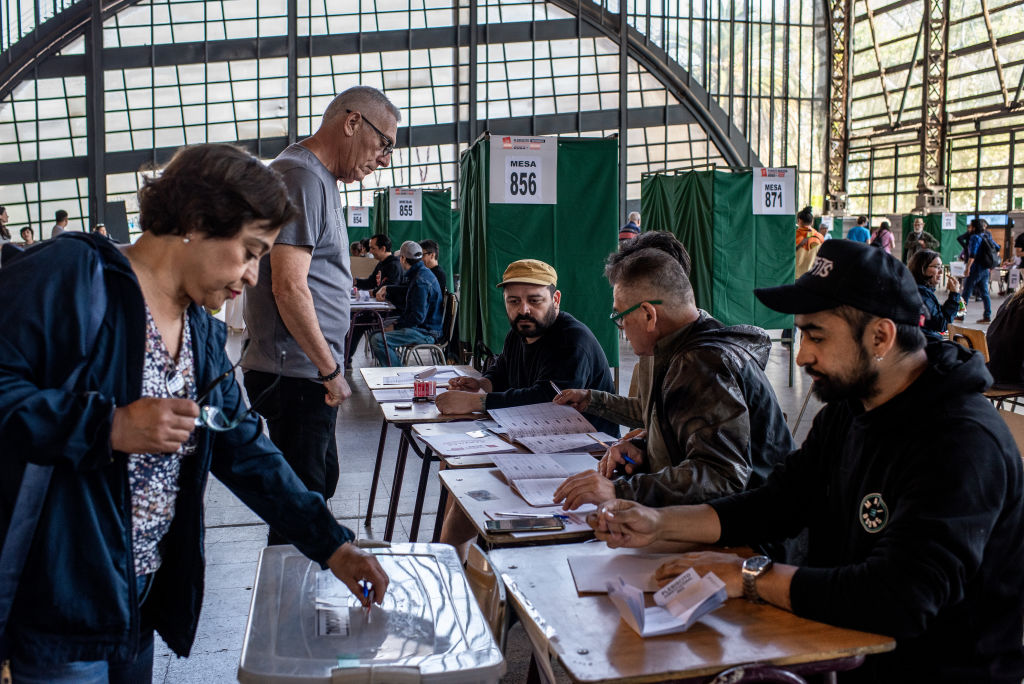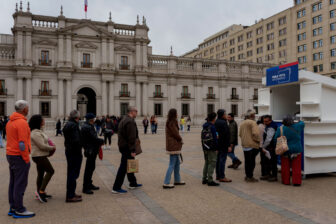On December 17, 56% of Chilean voters rejected a constitutional proposal drafted by a majority right-wing council. A previous text, written by a mainly left-wing convention, was dismissed by 62% of voters in the September 2022 plebiscite. After yesterday’s referendum, President Gabriel Boric said that the constitutional process was now closed for the remainder of his term.
AQ asked analysts to share their reaction to the result:
Patricio Navia, professor of liberal studies at NYU and professor of political science at Diego Portales University in Chile
As Chileans voted for a second time in less than two years to reject a new constitution, the 1980 charter adopted under the Pinochet military dictatorship gained democratic legitimacy. After all, Chileans preferred the current Magna Carta over the text drafted by a constitutional body with a right-wing majority or the text proposed in 2021-22 by a convention with a left-wing majority. Keep in mind that the 1980 constitution was reformed several times since the return to democracy in 1990.
After a polarizing and frustrating four-year constitution-writing process, Chileans have learned a valuable lesson. Fixing a constitution is a better way to move forward than starting anew. As people are dissatisfied with high levels of crime, a sluggish economy, and a lack of opportunities, the government and opposition should hear the loud and clear message that Chileans sent in their vote and start focusing on sensible market-friendly reforms that can put the country back on the right track that helped Chile become the fastest-growing country in the region between 1990 and 2010.
Chileans have suffered from constitutional fatigue, and they are in no mood to try again. In the future, they will stick to reforming the current constitution. President Boric, who took office in early 2022 as the most far-left president in Chile since Salvador Allende in the early 1970s, had tied his ambitious state-centered reform platform to the passage of a new constitution being drafted by the left-wing convention. This time around, he refrained from campaigning, as he was afraid that his unpopularity would convince some voters to approve the constitution drafted by the right-wing majority constitutional council.
Boric and the left had pushed for a new constitution as a magic pill solution to the discontent with democracy and inequality that triggered massive protests in 2019. Now, they must attempt to introduce gradual and sensible reforms within the framework of the market-friendly Pinochet-era text.
Isabel Aninat, dean of the law school at Adolfo Ibáñez University
Chilean politics remain in debt, President Boric stated last night. The question now is how deep that debt is. The trouble is that it has been compounding over the previous four years. As surveys show, 70% of the population would prefer politicians to reach agreements, even if they have to concede, a feeling that has only grown over time. Like in the previous constitutional process, several polls showed that people disagreed with how the second one was handled and its results. When the country sought consensus, both elected constitutional bodies—with different performative approaches—displayed polarized positions and uncompromising politicians. This was not due to how each topic was voted on, but because there was no common ground. Therein lies the origins of the debt.
After becoming the first country in the world to reject two consecutive constitutional proposals, the Chilean experiment will undoubtedly be analyzed for lessons to be drawn upon. Perhaps the main one is rooted precisely in its political deficiency. While procedural agreements were reached with almost widespread support, consensus on the substantive objectives of the reforms was missing in the processes—including President Bachelet’s attempt. Procedural rules were insufficient to generate this consensus, particularly amid changing social demands, social media and weak political trust. Without an extensive focus on the substantive issues themselves, the processes continuously drifted between fragmented negotiations, shifting agendas and volatile majorities.
The constitutional debate is over. We have learned that constitutional texts cannot solve all social troubles nor address all our desires. We now return to the democratic political forum—the same one in debt. How political parties, Congress, the government and the whole political spectrum reconvene is the question to watch and see if we finally start reducing that debt.
Claudia Heiss, head of the political science department at the Universidad de Chile School of Government
The result of Sunday’s referendum marks a defeat for the Republican Party, which pushed the expert commission’s moderate proposal to an extreme-right text through over 1,000 amendments introduced with the support of the traditional right. This could weaken Republicanos’ position and open a path of dialogue in Congress with center and center-left actors, with the goal of positioning itself as a good negotiator in the 2025 presidential election. The rise of extreme-right positions remains an attractive source of votes but may prove unable to reach the broad majorities required to win the presidency.
The Republican Party sought to transform the referendum into an evaluation of President Boric. Instead, the vote turned into a sour referendum on that party’s capacity to govern. This defeat, however, does not entail a victory for the left, which remains with a constitution that it has tried but failed to replace. President Boric’s administration has had little space to advance its program, given the lack of a Congressional majority and the radicalization of the right since the defeat of a left-leaning constitutional proposal in September 2022.
The rejection of a constitutional draft deemed too far to the right in 2023 and too far to the left in 2022 points to an electorate that is more moderate than the two elected constituent bodies. However, this moderation has not translated into support for centrist parties in recent elections. A “negative” vote, more prone to express discontent than to support a political program, may have been at play in this referendum. This poses a major challenge to political parties and representatives in the face of the upcoming municipal elections in 2024 and to the reconfiguration of the political system after this failed constitutional cycle.






